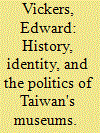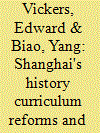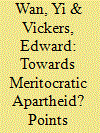| Srl | Item |
| 1 |
ID:
100658


|
|
|
| 2 |
ID:
126361


|
|
|
|
|
| Publication |
2013.
|
| Summary/Abstract |
This article examines the coverage of Japan in Shanghai's senior high history textbooks since the early 1990s - a period when the city's status as China's "showpiece for the global era" has been widely touted. Uniquely among cities on the Chinese mainland, Shanghai has throughout this period enjoyed the right to publish and prescribe its own textbooks for use in local schools (a right extended to most other regions only since the early 2000s). The portrayal of Japan in local texts thus offers a window onto the way in which a self-avowedly "global" Chinese metropolis has balanced an outward-looking and internationalist vision with the requirement for history to serve patriotic education. It also sheds light on the meaning and extent of local curricular "autonomy" in contemporary China.
|
|
|
|
|
|
|
|
|
|
|
|
|
|
|
|
| 3 |
ID:
184726


|
|
|
|
|
| Summary/Abstract |
This paper analyses rural migrant children's access to public schools in urban China, focusing on the implications of the recent introduction of points systems for apportioning school places. This approach, first piloted by Zhongshan city in Guangdong province from 2009, has steadily been extended nationwide. Here, we analyse the reasons for its spread and for divergence in its implementation in various urban districts. Notwithstanding rhetorical claims that points systems promote “fairness” or “equality” in the treatment of migrants, our analysis suggests that they maintain or even exacerbate the stratification of urban society, lending new legitimation to the hierarchical differentiation of entitlements. This is consistent with the aim of the 2014 “New national urbanization plan” to divert urban growth from megacities towards smaller cities. However, we argue that the use of points systems should also be seen in the context of an evolving bureaucratic-ideological project aimed at more rigorously monitoring and assessing China's entire population, invoking the logic of meritocracy for the purpose of control.
|
|
|
|
|
|
|
|
|
|
|
|
|
|
|
|
| 4 |
ID:
126359


|
|
|
|
|
| Publication |
2013.
|
| Summary/Abstract |
This article looks at how the major national (or pseudo-national) historical museums in China and Taiwan interpret and display very different "new rememberings" of Japan. The main focus is on the permanent exhibitions of the modern history wing of the National Museum of China (NMC; formerly the Museum of the Chinese Revolution), which finally reopened in 2011 after almost a decade of refurbishment, and of the National Museum of Taiwan History (NMTH), which opened in the same year. It discusses how museum portrayals of Japan reflect divergent public discourses on national identity. Through examining the relationship between museums and the apparatus of the Chinese state (ROC and PRC), the first section locates the NMC and NMTH in their bureaucratic and political contexts. A typology of approaches to the construction of national identity is then offered, considering the implications of different conceptions of identity for portrayals of Japan and its relationship with China or Taiwan. The remainder of the article looks in turn at the NMC and NMTH, outlining the history of each before examining how Japan is represented in their permanent exhibitions. It concludes by considering what can be learnt from this about the evolving relationship between official historical discourse and the broader political context on both sides of the Taiwan Strait.
|
|
|
|
|
|
|
|
|
|
|
|
|
|
|
|